Adherence Across the Life Span HIV Symposium
Details

Description
The Mid Atlantic AIDS Education Training Center (AETC) site at Johns Hopkins University will host the 8th Annual Adherence Across the Life Span HIV Symposium. This symposium will address the unique issues of getting to viral suppression through Antiretroviral Therapy (ART) adherence in adolescents as well those aging up with HIV/AIDS. Experts in the field will provide current information pertaining to the timeline from treatment to viral suppression of HIV including barriers such as COVID, mental health, substance use disorder, and stigma. We will also cover patient advocacy and best practices, through informative interactive presentations. You must register both on maaetc.org and also Zoom Meeting to attend this event.
Accreditation:
CME CEUs are available from the University of Nebraska for session 1 only.
CEUs for social workers, counselors, and therapists are provided by Johns Hopkins University for this event.
You must complete all required evaluations in order to be eligible to receive continuing education credit.
For more information, please contact Ingrid McDowell at imcdowe1@jhu.edu.
Materials
MODULE 3 ART Initiation Adherence and Retention in Care 2022 Update John Hogan.pdf:
DunnAdherance across the lifespan 11 15 2022 FINAL.pdf:
The Intersectionality of HIV, Substance Use Disorder and Mental Health. Dr. Edwards 11.22.22.pdf:
HIV and Aging A Changing Landscape 11.22.22 Final.pdf:
Topics
A variety of the listed topics will be discussed at this event.
- HIV Transmission Risk Assessment
- Pre-exposure prophylaxis (PrEP)
- Adult and adolescent antiretroviral treatment
- Aging and HIV
- Antiretroviral treatment adherence, including viral suppression
- Hepatitis C
- Medication-assisted therapy for substance use conditions (e.g., buprenorphine, methadone, and/or naltrexone in combination with behavioral therapies)
- Mental health disorders
- Stigma
- Community linkages
- Health care coverage
- Motivational Interviewing
- Use of technology for patient care (e.g., electronic health records, etc.)
- Young adults (ages 18 to 24)
- Older adults (ages 50 and over)
- Women



